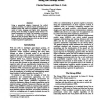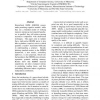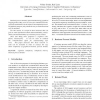928 search results - page 7 / 186 » Using fMRI to Test Models of Complex Cognition |
FLAIRS
2001
15 years 3 months ago
2001
Using a generalized adaptive frameworkfor unified cognitive modeling,wereplicate humanperformanceon a standardStrooptask withinan explanatorycomputational modelof vision, language...
114
click to vote
ACL
2010
14 years 11 months ago
2010
Hierarchical HMM (HHMM) parsers make promising cognitive models: while they use a bounded model of working memory and pursue incremental hypotheses in parallel, they still achieve...
111
Voted
IEEEICCI
2006
IEEE
15 years 7 months ago
2006
IEEE
Business process models, often modelled using graphical languages like UML, serve as a base for communication between the stakeholders in the software development process. To ful´...
VL
2009
IEEE
15 years 8 months ago
2009
IEEE
Understanding and maintaining the structure of large ontologies is a cognitively demanding task. Visualizations are commonly used as a cognitive aid for presenting large ontologie...
105
Voted
NIPS
2007
15 years 3 months ago
2007
Current computational models of bottom-up and top-down components of attention are predictive of eye movements across a range of stimuli and of simple, ´Čüxed visual tasks (such a...



